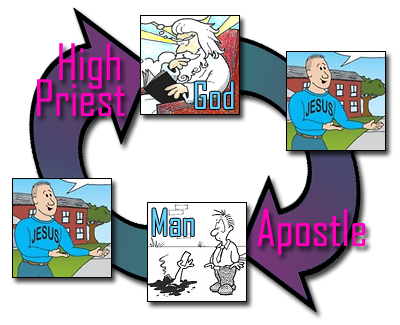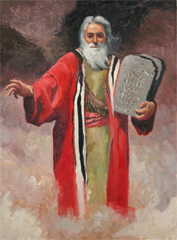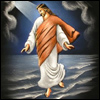The Promise Remains of Entering His Rest (Heb 3:1-4:15)
Christ is Greater than Moses and Joshua
Review
This book contrasts Jesus with things that were dear to Judaism.
Christ is superior to the prophets, angels (addresses 2 objections: how could he be a man, how could he die)…
Next we address Moses.
(3.1) Christ Greater than Moses [Heb. 3:1-6]
“Therefore, holy brethren, partakers of the heavenly calling, consider the Apostle and High Priest of our confession, Christ Jesus, who was faithful to Him who appointed Him, as Moses also was faithful in all His house. For this One has been counted worthy of more glory than Moses, inasmuch as He who built the house has more honor than the house. For every house is built by someone, but He who built all things is God. And Moses indeed was faithful in all His house as a servant, for a testimony of those things which would be spoken afterward, but Christ as a Son over His own house, whose house we are if we hold fast the confidence and the rejoicing of the hope firm to the end.” (Heb 3:1-6)
Big picture of this paragraph: Christ is being compared to Moses, and shown how Christ is superior in his glory.
Why compare Christ to Moses? “He was the man with whom God had spoken face to face as a man speaks with his friend. He was the direct recipient of the Ten Commandments, the very Law of God. The greatest thing in all the world for the Jew was the Law, and Moses and the Law were one and the same thing.” (DSB)
“Therefore, holy brethren, partakers of the heavenly calling, consider the Apostle and High Priest of our confession, Christ Jesus,” (Heb 3:1)
Once again, like the previous verse (2:17-18), we have an appearance of “hothen” (wherefore) for therefore. This should be like a warning flare that there’s an important consequence coming. What’s the cause of this? God being a merciful and faithful high priest, making atonement for all people. And the consequence? We should consider the Apostle and High Priest Jesus.
|
God helps man
not angels |
|
Jesus shares in humanity
renders Satan/death powerless makes propitiation for us helps the tempted |
|
Consider Jesus
Apostle & High Priest of our Confession |
How does the author describe Christ’s brethren?
- holy – separated from sin, consecrated by God, set aside for God’s purposes. Hagios [G40] can be translated either as holy, the first part of the compound word Holy Spirit, or as saints (believers). Is the author trying to convey that he is treating the audience as believers? For Jewish Christians holiness has a double meaning–the Jews were called a “holy people”, set apart by God, and also as believers (concecrated and santified). Is the audience saved? Yes. They wouldn’t be holy brethren otherwise.
- Brethren – brother, “sibling” of Christ. How do you get to have the same father as Christ? By being born again
- partakers of the heavenly calling – sharers of the heavenly calling. Keeping in mind the audience, this would be a contrast to the earthly calling with earthly blessings that the Jews had been called to in the old testament. The earthly calling came with earthly blessings (eg: fertile soil, bountiful crops), but partaking of a heavenly calling would lead to everlasting spiritual blessings.
|
Moving From
|
To
|
| An Earthly Calling | A Heavenly Calling |
| Eartly Inheritance (land) | Heavenly Inheritance |
| Animal sacrifices | Jesus’s sacrifice |
Consider – conveys faithful attention, giving of time, perceiving through the time.
| Do you give serious prolonged thought to Christ? |
- Apostle – (lit.) One who is sent (usually by God w/ a message for people).Who are we to consider? The Apostle and High Priest, Christ Jesus
- Represents God to Man
- Proclaims, foretells, exhorts, presents God to the People
- High Priest – intercedes to and speaks to God on behalf of men.
- Represents Man to God
- People’s representative before God the father

of our confession – confess or profess = to consent, subscribe to, declare, or identify with. Declaration that we confess we subscribe to Christ [but do our actions line up with our words?]
 “who was faithful to Him who appointed Him, as Moses also was faithful in all His house.” (Heb 3:2)
“who was faithful to Him who appointed Him, as Moses also was faithful in all His house.” (Heb 3:2)
Before: Jesus was shown to be greater than angels and prophets. Now, the comparison draws to Moses. Some in the OT might have considered Moses more important than the prophets because he brought the law to the people from God and led Israel from slavery to the promised land.
 |
 |
 |
 |
|
| Jesus | >> | Prophets | Angels | Moses |
Moses and Jesus both enunciated ethical systems. The laws given through Moses from God had to do with conduct, Jesus’s (ie: sermon on the mount) had to do with character. All the more reason to consider him.
Starts with Moses’s faithfulness (3:2), not Moses’s failures (eg. slaying of the Egyptian, smiting of the Rock, etc), and if you keep reading ahead it never gets into the failures of Moses, the importance seems to be on his faithfulness. What God called him to do, he did.
What God remembers is our
faithfulness, not our failures.
Who was Moses faithful to? God.His house = God’s house, not Moses’s. Note: House occurs 7 times in this section (Missler)
| Are you faithful to those God has placed over you? To your parents? To your bosses? To God himself? |
“For this One has been counted worthy of more glory than Moses, inasmuch as He who built the house has more honor than the house.” (Heb 3:3)
- Local context = Moses was faithful in building the tabernacle.
- House = Israel in a sense. Moses was part of the house, Jesus was the creator.
 Moses |
 Jesus |
| Created | Creator |
| Servant of God | Son of God |
| Faithful in God’s House | Built God’s House |
| Man of God | God Himself |
| Descendant of Abraham (sinful) | Sinless |
| Prophet of God’s Truth | Embodiment of God’s truth |
| Priestly Role (see ex 24:6,32:11 | High Priest |
| King in Jeshunun (deu 33:5 | King of Kings |
| Delivered Israel from Egypt | Delivered Israel From Eternity |
| Built Earthly Tabernacle | Build Place on High |
| Led through the Wilderness | Leads to Glory |
How is Jesus superior to Moses? Moses was faithful *in* the house, but Jesus *built* the house.
“For every house is built by someone, but He who built all things is God.” (Heb 3:4) “And Moses indeed was faithful in all His house as a servant, for a testimony of those things which would be spoken afterward,” (Heb 3:5) “but Christ as a Son over His own house, whose house we are if we hold fast the confidence and the rejoicing of the hope firm to the end.” (Heb 3:6)
What is being contrasted here? Moses and God/Jesus–God’s superiority over Moses because he’s the creator not a creature, and because Jesus is the Son of God rather than servant of God.
|
Evidences of Christ’s superiority. (Missler, v. 1-6)
|
|
 Moses |
 Jesus |
| An Apostle | The Apostle |
| Member of a House | Built the House |
| Involved a single house | All Houses |
| Just a Man | Was God |
| A Servant | A Son |
| Testimony of things | The Substance or fullfillment of that testimony |
| Just a servant in his house | Son over house |
In verse 4, who does “He” refer to? God. Moses didn’t ever claim to have built all things. That claim is reserved for God.
Who was Moses a servant of? Him, aka God.
Was Moses ever called a son of God? No. Only Christ was.
IF we hold fast? You and I need to “do something”? McGee asserts that this “if” is not a condition, but a method of argumentation and logic (the whole letter is rife with this sort of logical appeal) and saying “since we hold fast” would be equally logically equivalent to if we hold fast.
| Application: Are you of God’s House? |
| McGee makes an interesting point that those not of God’s house, those who don’t really believe, can be drawn out by influences such as cults, and that faithfulness to God’s house acts like a strainer. Are you really holding on? Also Missler makes a point about a sense of house that we are a house of the indwelling holy spirit.
If we are sons and partakers, we will be faithful, holding fast = proof we are of God’s house. |
(3.2) Danger of Unbelief [Heb. 3:7-19]
3:7-4:2 Danger of Doubting or Departing from the living God
Therefore, as the Holy Spirit says: “Today, if you will hear His voice, (Heb 3:7) Do not harden your hearts as in the rebellion, In the day of trial in the wilderness, (Heb 3:8) Where your fathers tested Me, tried Me, And saw My works forty years. (Heb 3:9) Therefore I was angry with that generation, And said, ‘They always go astray in their heart, And they have not known My ways.’ (Heb 3:10) So I swore in My wrath, ‘They shall not enter My rest.’ ” [16] (Heb 3:11)
Israel is being used as an example here. They doubted God, never entered Canaan. Sending out spies wasn’t actually necessary, they could have entered it. They believed God enough to come out of Egypt, but not enough to enter into Canaan (McGee). [Aside: Interesting note about how they entered in: The priests with the ark on their shoulders led the way, this is symbolic.]
Once again, in 3:7 we have another wherefore (hothen). This quotation is from Psalm 95:7-11. The author ascribes psalm to the Holy Spirit (rather than David). What is going on? The Holy Spirit is “interpreting” these old testament verses for us.
Note that not all uses of the word “rest” are the same: (McGee)
-Rest of Salvation (Mt. 11:28)
-Rest of Redemption (Not slaves in Egypt)
-Rest of Obedience (Mt. 11:29)
God’s rest has several meanings in Scripture:
- the seventh day of creation and the weekly Sabbath commemorating it (Gen. 2:2; Heb. 4:4-9);
- the Promised Land of Canaan (Deu. 12:8-12; Psalm 95);
- peace with God now because of our relationship with Christ through faith (Mat. 11:28; Heb. 4:1, Heb. 4:3, Heb. 4:8-11); and
- our future eternal life with Christ (Heb. 4:8-11).
All of these meanings were probably familiar to the Jewish Christian readers of Hebrews. We can apply the verses as a warning about God’s anger in the face of human rebellion against his Kingdom. By rejecting God’s provision (Christ) and not enduring in our faith, we miss the opportunity for spiritual rest. LASB
In unbelief, we can’t enter into the land of promise. Spiritually, this should remind us to accept Christ as savior. Walk by him in faith. Commit life to him. That is when you will know the joys of “Canaan” (spiritually). The wilderness in contrast was a place of death, unrest, aimlessness, dissatisfaction. In the wilderness? You won’t know what rest is.
| Today you have a choice to hear His voice. Are you taking it? |
“A hardened heart is as useless as a hardened lump of clay or a hardened loaf of bread. Nothing can restore it and make it useful. The writer of Psalm 95 warns against hardening our hearts as Israel did in the wilderness by continuing to resist God’s will (Exo_17:7; Numbers 13; 14; 20). The people were so convinced that God couldn’t deliver them that they simply lost their faith in him. People with hardened hearts are so stubbornly set in their ways that they cannot turn to God. This does not happen suddenly or all at once; it is the result of a series of choices to disregard God’s will. Let people know that those who resist God long enough, God will toss aside like hardened bread, useless and worthless.” LASB
God’s Oath… 3:11 – it wasn’t necesary for God to take an oath–but he did. (McGee).
God is often represented in the Scriptures as “swearing” – and usually as swearing by himself, or by his own existence. Of course this in figurative, and denotes a strong affirmation, or a settled and determined purpose. An oath with us implies the strongest affirmation, or the expression of the most settled and determined purpose of mind. The meaning here is, that so refractory and perverse had they showed themselves, that he solemnly resolved that they should never enter into the land of Canaan. Barnes
Beware, brethren, lest there be in any of you an evil heart of unbelief in departing from the living God; (Heb 3:12) but exhort one another daily, while it is called “Today,” lest any of you be hardened through the deceitfulness of sin. (Heb 3:13)
12 Take heed (beware) brethren – evil heart of unbelief.
“In view of the conduct of the rebellious Jews, and of their fearful doom, be on your guard lest you also be found to have had the same feelings of rebellion and unbelief.” Barnes
It should terrify you that it is possible to fall away, we are vulnerable.
heart of unbelief – Not believing God = a great sin.
Having a heart of belief vs unbelief: 2 sides of the same truth. God is sovereign. Man is sovereign. Sovereignty of God. Responsibility of Man.
today (v13) = right now.
Deceitfulness of sin (v13) Sin is deceitful!! Example of sin’s deceitfulness: “My conscience doesn’t condemn me…”
Exhort one another, we ought to do this, exhort, encourage.
| How are you exhorting and encouraging others today? |
2 Cor 3:6, 14-15 – Glory of the law made Moses’s face shine (but the law’s glory = fading). The glory of Christ = greater. There is a veil on hearts. When heart is ready to give up that veil, the intellectual problems tend to dissolve, and the veil over the mind is freed and can come to Christ to be saved.unbelief robbing people of salvation. Its not usually intellectual problems that really keep people from Christ but sin problems (McGee).
Heb 3:14 For we have become partakers of Christ if we hold the beginning of our confidence steadfast to the end, 15 while it is said: “Today, if you will hear His voice, Do not harden your hearts as in the rebellion.” 16 For who, having heard, rebelled? Indeed, was it not all who came out of Egypt, led by Moses? 17 Now with whom was He angry forty years? Was it not with those who sinned, whose corpses fell in the wilderness? 18 And to whom did He swear that they would not enter His rest, but to those who did not obey? 19 So we see that they could not enter in because of unbelief.
harden you heart. heart = seat of the will. implication? willful neglect.
Summarizing wilderness experience of Israel.
Rebelled = Provoked in (KJV) = thought of God being displeased w/ unbelief
The sin that grieved God was unbelief.
Rests: (McGee)
1) Creation Rest
2) Entrance to Canaan
3) Rest of Salvation
4) Rest of Consecration
5) Rest of Heaven
There is a rest of fully trusting in God, not only for salvation, but also for consecration.
| DANGER | |
 |
UNBELIEF DOUBTING GOD’S PROMISES CAN |
Israel’s sin in the wilderness was not thirst, but disbelief (God led them there, would he not provide water?) water = symbolic of washing of the word. rock symbolic of Christ. Moses’s rod was a symbol of Judgment. turns into serpent = symbol of curse. rock had to be stricken. Spiritual rock that followed them (Christ) 1 cor 10, 10:4 rock is Christ. (also see ps 105:??) Num 20…40 years later. speak to the rock. used Aaron’s rod now. was he supposed to smite it now? no. The word for Rock here is a different Hebrew word for rock, for elevated rock.
(3.3, 4:1-5) Promise Remains of Entering His Rest
Therefore, since a promise remains of entering His rest, let us fear lest any of you seem to have come short of it. (Heb 4:1)
| Couldn’t enter b/c of unbelief |  |
Promise remains of entering rest, let us fear lest… |
This is the first “Let Us”: The writer presents a challenge to us..
Although fear is often a sin in the bible Fearing God is a good kind of Fear because we don’t want to miss the rest of salvation. We would miss the rest of salvation if we hear the gospel but don’t believe it.
 |
Fear God Lest we come short and |
For indeed the gospel was preached to us as well as to them; but the word which they heard did not profit them, not being mixed with faith in those who heard it. (Heb 4:2)
Hearing the word of the Lord is not enough to profit you unless it is mixed with faith. (4:2)
Unless the Gospel is mixed with faith, it will be of no profit. Are you believing God’s word in faith?
For we who have believed do enter that rest, as He has said: “So I swore in My wrath, ‘They shall not enter My rest,’ ” although the works were finished from the foundation of the world. (Heb 4:3)
(4:3) Those who believe in faith enter God’s rest.
You can’t enter that rest until you listen to God.
(star) Eph. 2:10(star) we are God’s workmanship.
For He has spoken in a certain place of the seventh day in this way: “And God rested on the seventh day from all His works”; (Heb 4:4)
sabbath = resting in Christ
and again in this place: “They shall not enter My rest.” (Heb 4:5)
(Joshua led them in, couldn’t give them rest!)
(3.4, 4:6-15) Christ is >> Joshua (adjust seg.??)
Heb 4:6 Since therefore it remains that some must enter it, and those to whom it was first preached did not enter because of disobedience, 7 again He designates a certain day, saying in David, “Today,” after such a long time, as it has been said: “Today, if you will hear His voice, Do not harden your hearts.”
(4:7) It is possible for you to enter into God’s rest TODAY.
Do we believe God is going to take care of us? Are are you worrying about circumstance?
| Do you have disobedience that is keeping you from entering God’s rest? If you aren’t sure you should ask God. |
Every day you need to be hearing God’s
voice. If you aren’t you need to repent.
Col 2:16-18 Only one of the 10 commandments broken (Sabbath) -> relation to heb 4:1- resting from works as God did from his.
For if Joshua had given them rest, then He would not afterward have spoken of another day. (Heb 4:8)
Joshua was able to lead the Israelites into the promised land but he couldn’t give them rest (they still had many battles to fight to claim the promised land)
Joshua = the OT (hebrew) word for savior
Jesus = the NT (greek) word for savior
At the end of Joshua’s life there was yet much to conquer, the people hadn’t fully entered into God’s blessings.
There remains therefore a rest for the people of God. (Heb 4:9)
We can be walking in God’s rest EVERY day. The 7th day is today. Even in Trial . (Paul’s beatings = light bother…he was in the spirit, in God’s rest.
Into the future there is a heavenly rest.
For he who has entered His rest has himself also ceased from his works as God did from His. (Heb 4:10)
Why did Jesus rest on the 7th day? It was finished.
4:10 God’s rest is not works-based.
“all the way to heaven is heaven” (McGee)
Let us therefore be diligent to enter that rest, lest anyone fall according to the same example of disobedience. (Heb 4:11)
 |
Be Diligent to Lest anyone fall according |
For the word of God is living and powerful, and sharper than any two-edged sword, piercing even to the division of soul and spirit, and of joints and marrow, and is a discerner of the thoughts and intents of the heart. (Heb 4:12)
Heb 4:12 was two edged sword, consider the context.
“God sings big doors on little hinges” (McGee). The for at the beginning of this sentance is significant to the logic going on here.
Word = the living word or the written word? Some scholars disagree on how to interpret this.
Powerful = energizing (greek)
discerner of thoughts and intents = the bible does not primarily deal with acts, but the heart and thoughts (See Mt. 15:19)
And there is no creature hidden from His sight, but all things are naked and open to the eyes of Him to whom we must give account. (Heb 4:13)
Nothing can be concealed from God.
 |
Hold Fast because we have a great |
Seeing then that we have a great High Priest who has passed through the heavens, Jesus the Son of God, let us hold fast our confession. (Heb 4:14)
For we do not have a High Priest who cannot sympathize with our weaknesses, but was in all points tempted as we are, yet without sin. (Heb 4:15)
God loves you so much he has people praying for you that you don’t even know about.
Jesus’s ministry was so powerful b/c he spent so much time with God.
Repent that you haven’t been spending enough time with Jesus.
—
sin deceives. It leads us to appetites we shouldn’t have.
